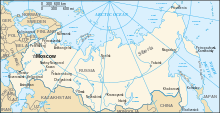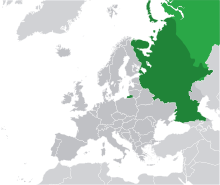Our website is made possible by displaying online advertisements to our visitors.
Please consider supporting us by disabling your ad blocker.
Russia
Russian Federation Российская Федерация (Russian) | |
|---|---|
| Anthem: Государственный гимн Российской Федерации Gosudarstvennyy gimn Rossiyskoy Federatsii "State Anthem of the Russian Federation" | |
 Recognised territory of Russia is shown in dark green; claimed but internationally unrecognised territory is shown in light green.[a] Recognised territory of Russia is shown in dark green; claimed but internationally unrecognised territory is shown in light green.[a]
| |
| Capital and largest city | Moscow 55°45′21″N 37°37′02″E / 55.75583°N 37.61722°E |
| Official and national language | Russian[3] |
| Recognised regional languages | 35 regional official languages[4] |
| Ethnic groups | |
| Religion |
|
| Demonym(s) | Russian |
| Government | Federal semi-presidential republic[9] under an authoritarian[10][11] dictatorship[12][13] |
| Vladimir Putin | |
| Mikhail Mishustin | |
| Legislature | Federal Assembly |
| Federation Council | |
| State Duma | |
| Formation | |
| 882 | |
| 1157 | |
| 1282 | |
| 16 January 1547 | |
| 2 November 1721 | |
| 15 March 1917 | |
| 30 December 1922 | |
| 12 June 1990 | |
| 12 December 1991 | |
| 12 December 1993 | |
| 8 December 1999 | |
| Area | |
• Total | 17,098,246 km2 (6,601,670 sq mi)[15] (within internationally recognised borders) |
• Water (%) | 13[14] (including swamps) |
| Population | |
• 2024 estimate | (9th) |
• Density | 8.4/km2 (21.8/sq mi) (187th) |
| GDP (PPP) | 2024 estimate |
• Total | |
• Per capita | |
| GDP (nominal) | 2024 estimate |
• Total | |
• Per capita | |
| Gini (2020) | medium inequality |
| HDI (2022) | very high (56th) |
| Currency | Ruble (₽) (RUB) |
| Time zone | UTC+2 to +12 |
| Drives on | Right |
| Calling code | +7 |
| ISO 3166 code | RU |
| Internet TLD | |
Russia,[b] or the Russian Federation,[c] is a country spanning Eastern Europe and North Asia. It is the largest country in the world by area, extending across eleven time zones and sharing land borders with fourteen countries.[d] It is the world's ninth-most populous country and Europe's most populous country. Russia is a highly urbanised country, with 16 of its population centres having more than 1 million inhabitants. Its capital and largest city is Moscow. Saint Petersburg is Russia's second-largest city and its cultural capital.
The East Slavs emerged as a recognised group in Europe between the 3rd and 8th centuries CE. The first East Slavic state, Kievan Rus', arose in the 9th century, and in 988, it adopted Orthodox Christianity from the Byzantine Empire. Kievan Rus' ultimately disintegrated; the Grand Duchy of Moscow led the unification of Russian lands, leading to the proclamation of the Tsardom of Russia in 1547. By the early 18th century, Russia had vastly expanded through conquest, annexation, and the efforts of Russian explorers, developing into the Russian Empire, which remains the third-largest empire in history. However, with the Russian Revolution in 1917, Russia's monarchic rule was abolished and eventually replaced by the Russian SFSR—the world's first constitutionally socialist state. Following the Russian Civil War, the Russian SFSR established the Soviet Union with three other Soviet republics, within which it was the largest and principal constituent. At the expense of millions of lives, the Soviet Union underwent rapid industrialisation in the 1930s and later played a decisive role for the Allies in World War II by leading large-scale efforts on the Eastern Front. With the onset of the Cold War, it competed with the United States for ideological dominance and international influence. The Soviet era of the 20th century saw some of the most significant Russian technological achievements, including the first human-made satellite and the first human expedition into outer space.
In 1991, the Russian SFSR emerged from the dissolution of the Soviet Union as the Russian Federation. A new constitution was adopted, which established a federal semi-presidential system. Since the turn of the century, Russia's political system has been dominated by Vladimir Putin, under whom the country has experienced democratic backsliding and become an authoritarian dictatorship. Russia has been militarily involved in a number of conflicts in former Soviet states and other countries, including its war with Georgia in 2008 and its war with Ukraine since 2014, which has involved the internationally unrecognised annexations of Ukrainian territory including Crimea in 2014 and four other regions in 2022 during an ongoing invasion.
Russia is a permanent member of the United Nations Security Council; a member state of the G20, SCO, BRICS, APEC, OSCE, and WTO; and the leading member state of post-Soviet organisations such as CIS, CSTO, and EAEU/EEU. It possesses the largest stockpile of nuclear weapons and has the third-highest military expenditure. Russia is generally considered a great power and is a regional power. Internationally, Russia ranks very low in measurements of democracy, human rights and freedom of the press; the country also has high levels of perceived corruption. As of 2024, Russia has a high-income economy which ranks eleventh in the world by nominal GDP and fourth at purchasing power parity, relying on its vast mineral and energy resources; the world's second-largest for oil production and natural gas production. Russia is home to 32 UNESCO World Heritage Sites.
- ^ Pifer, Steven (17 March 2020). "Crimea: Six years after illegal annexation". Brookings Institution. Archived from the original on 14 April 2022. Retrieved 30 November 2021.
- ^ Cite error: The named reference
Chapple-2019was invoked but never defined (see the help page). - ^ Chevalier, Joan F. (2006). "Russian as the National Language: An Overview of Language Planning in the Russian Federation". Russian Language Journal. 56 (1). American Councils for International Education ACTR / ACCELS: 25–36. doi:10.70163/0036-0252.1233. JSTOR 43669126.
{{cite journal}}: CS1 maint: ignored DOI errors (link) - ^ "What Languages Are Spoken in Russia?". WorldAtlas. 1 August 2017. Archived from the original on 19 February 2024. Retrieved 19 February 2024.
- ^ Национальный состав населения (in Russian). Federal State Statistics Service. Archived from the original on 30 December 2022. Retrieved 30 December 2022.
- ^ "Русская православная церковь" (in Russian). Фонд Общественное Мнение, ФОМ (Public Opinion Foundation). 2 May 2024. Archived from the original on 16 May 2024. Retrieved 10 June 2024.
- ^ "Русская православная церковь" (in Russian). Фонд Общественное Мнение, ФОМ (Public Opinion Foundation). 2 May 2024. Archived from the original on 3 May 2024. Retrieved 10 June 2024.
- ^ Shevchenko, Nikolay (21 February 2018). "Check out Russia's Kalmykia: The only region in Europe where Buddhism rules the roost". Russia Beyond. Archived from the original on 27 February 2018. Retrieved 11 February 2023.
- ^ Cite error: The named reference
ciawas invoked but never defined (see the help page). - ^ "Russia: Freedom in the World 2023 Country Report". Freedom House. 9 March 2023. Archived from the original on 11 March 2023. Retrieved 17 April 2023.
- ^ Cite error: The named reference
Kuzio-2016was invoked but never defined (see the help page). - ^ Krzywdzinski, Martin (2020). Consent and Control in the Authoritarian Workplace: Russia and China Compared. Oxford University Press. p. 252. ISBN 978-0-19-252902-2.
officially a democratic state with the rule of law, in practice an authoritarian dictatorship
- ^ Fischer, Sabine (2022). "Russia on the road to dictatorship". SWP Comment. Stiftung Wissenschaft und Politik (SWP), German Institute for International and Security Affairs. doi:10.18449/2022C30. Retrieved 24 July 2024.
- ^ "The Russian federation: general characteristics". Federal State Statistics Service. Archived from the original on 28 July 2011. Retrieved 5 April 2008.
- ^ "World Statistics Pocketbook 2016 edition" (PDF). United Nations Department of Economic and Social Affairs. Statistics Division. Archived (PDF) from the original on 4 August 2019. Retrieved 24 April 2018.
- ^ Including 2,470,873 people living on the annexed Crimean Peninsula
- ^ Оценка численности постоянного населения на 1 января 2024 г. и в среднем за 2023 г. и компоненты её изменения [Estimates of the resident population as of January 1, 2024 and averaged over 2023 and the components of change] (XLSX). Russian Federal State Statistics Service (in Russian). Archived from the original on 6 April 2024. Retrieved 22 June 2024.
- ^ a b c d "World Economic Outlook Database, October 2024 Edition. (Russia)". www.imf.org. International Monetary Fund. 22 October 2024. Retrieved 11 November 2024.
- ^ "GINI index (World Bank estimate) – Russian Federation". World Bank. Archived from the original on 20 April 2017. Retrieved 23 June 2022.
- ^ "Human Development Report 2023/24" (PDF). United Nations Development Programme. 13 March 2024. Archived (PDF) from the original on 13 March 2024. Retrieved 13 March 2024.
- ^ "Russia", The World Factbook, Central Intelligence Agency, 2022, archived from the original on 9 January 2021, retrieved 14 October 2022
Cite error: There are <ref group=lower-alpha> tags or {{efn}} templates on this page, but the references will not show without a {{reflist|group=lower-alpha}} template or {{notelist}} template (see the help page).
Previous Page Next Page






